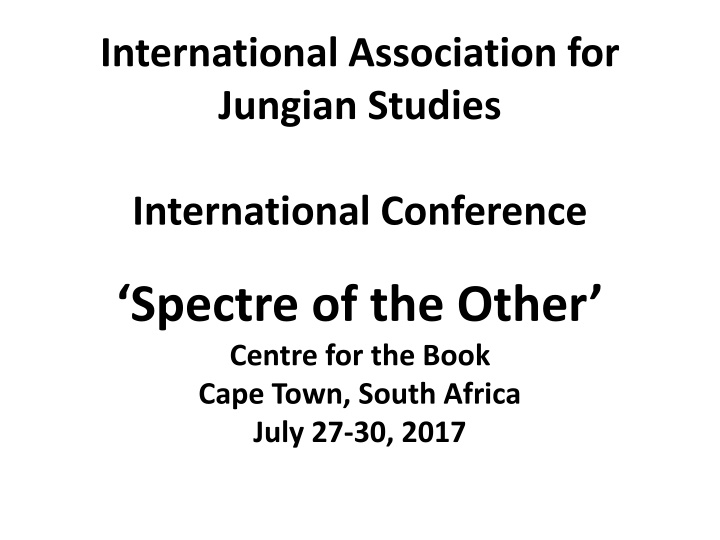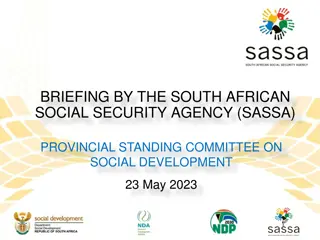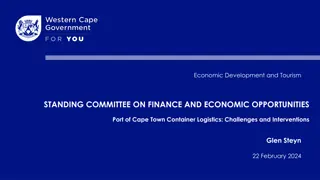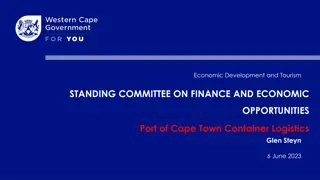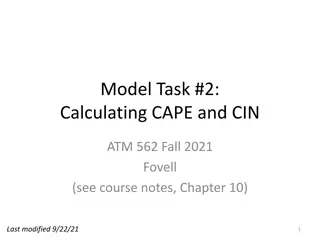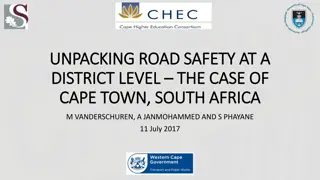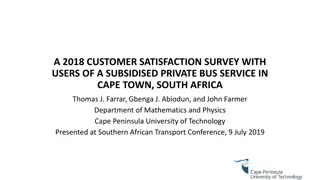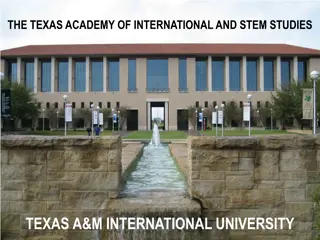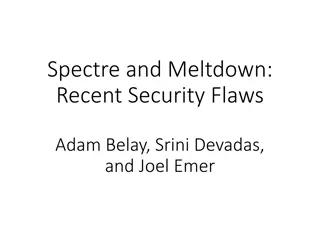International Conference on Jungian Studies - Spectre of the Other in Cape Town
The International Association for Jungian Studies is hosting a conference in Cape Town, South Africa, from July 27-30, 2017. The event explores various themes such as postcolonialism, Jungian psychology, women, dreams, and more. Co-sponsored by the Center for Applied Jungian Studies and the South African Association of Analytical Psychology, the conference features key panel presentations, discussions, and cultural events. Attendees can look forward to engaging sessions, a gala dinner, and opportunities for networking in a rich academic and social setting.
Download Presentation

Please find below an Image/Link to download the presentation.
The content on the website is provided AS IS for your information and personal use only. It may not be sold, licensed, or shared on other websites without obtaining consent from the author.If you encounter any issues during the download, it is possible that the publisher has removed the file from their server.
You are allowed to download the files provided on this website for personal or commercial use, subject to the condition that they are used lawfully. All files are the property of their respective owners.
The content on the website is provided AS IS for your information and personal use only. It may not be sold, licensed, or shared on other websites without obtaining consent from the author.
E N D
Presentation Transcript
International Association for Jungian Studies International Conference Spectre of the Other Centre for the Book Cape Town, South Africa July 27-30, 2017
Conference Co-Sponsors Center for Applied Jungian Studies (CAJS) South African Association of Analytical Psychology (SAAJA)
The Spectre of the Other CONFERENCE THEMES 1-Postcolonial 5-Women 2-Cultural/Political 6-Somatic/Embodiment 3- Jungian Psychology 7-Dreams 4-Africa, the Continent/ Nature/Healing 8-Shadow 9-Literary/Myth 10-Dreams/Visitations/ Collective Unconscious CONFERENCE EVENTS 5.30 PM Thursday, July 27: Wine and Cheese Reception; hosted by South African Association of Analytical Psychology (SAAJA) and IAJS 12.30-1.30 PM Friday, July 28: IAJS Annual Membership Meeting led by IAJS Co-Chairs Elizabeth Brodersen and Michael Glock and the IAJS Executive Committee 5:45 PM Friday, July 28: Film and Discussion, complimentary wine facilitated by John Beebe at the Labia Theatre: 68 Orange St, Gardens, Cape Town (close to conference venue); hosted by Centre for Applied Jungian Studies (CAJS) (no charge for conference attendees) 6.30 PM Saturday, July 29: Gala Dinner and Dance at The Pepper Club, Cape Town (Cost: $50)
Thursday 27/7 Auditorium Room 3 Room 2: Registration 7:00-8:30 AM Daily Theme Themes: 1-Postcolonial; 2-Cultural/Political; 3- Jungian Psychology; 4-Africa, the Continent/Nature/Healing; 5-Women; 6- Somatic/Embodiment; 7-Dreams; 8-Shadow; 9-Literary/Myth; 10-Dreams/Visitations/Collective Unconscious 8.30 10.45 8.30- 8.50 Welcome to the Conference in the Auditorium Welcome Stephen Farah and Marybeth Carter, IAJS Conference Co-Chairs 8.50- 9.10 AM Ritual Opening of Conference Space Lily Rose Nomfundo Mlisa, PhD (Doors will be closed during the ritual. Please arrive on time or wait to enter after the ritual.) 9.10-10.45 AM Key Panel Presentation Fanny Brewster, Jungian Analyst, Professor, Author In Remembrance and Celebration of Other Nomfundo Mlisa, Clinical Psychologist, Professor, Author Response to Jungian Psychology and Its Closer Synthesis with Traditional Healing: The Phenomenological Experiences in Ukuthwasa Andrew Samuels, Psychotherapist, Professor, Activist, Author Jung and Africans : A Critical and Contemporary Review of Some of the Issues 10.45 11.00 Refreshment
Thursday 27/7 Auditorium Room 2: Room 3 Daily Theme Themes: 1-Postcolonial; 2-Cultural/Political; 3- Jungian Psychology; 4-Africa, the Continent/Nature/Healing; 5-Women; 6- Somatic/Embodiment; 7-Dreams; 8-Shadow; 9-Literary/Myth; 10-Dreams/Visitations/Collective Unconscious 11.00 - 1.00 Theme 1- Postcolonial Theme 4- Africa/Nature/Healing Theme 3 Jungian Psychology 11.00 1.00 PM 3 X 20 minute panel/ discussion 11. 00 1.00 PM 1 X 120 minute panel; 11.00 - 1.00 AM 4 X 20 minute panel/ discussion Prosper Baeni (Africa the Lost Continent: From Colonialism to Globalization) 120 minute panel: Lily-Rose Nomfundo Mlisa, Peter Ammann, and Renee Estelle Ramsden (African Traditional Healers and Jungian Analysts: The Fort Hare Symposium) Gustavo Beck (Trumping Walls: Reflections on the Bridge between Social and Analytical Justice) Alan Vaughn (The African Diaspora: Post- modern Views of Analytical Psychology in Cultural Context) Martyna Chrzescijanska (Between Eco and Ego: The Problem of Borders in Depth Psychology) Mathew Niall Mather (Mandela and the New South Africa: A *Big Dream*) Tatsuhiro Nakajima (Think Outside the Box! Jung, Levi-Strauss, and Postcolonialism: Spectrum of Psychology and Sociology) Elane de Vos (Kinship Libido in the Xhosa Tale *Hunger Moon:* A Cross Cultural Analysis Using Jungian Theory and Ubuntu 1.00- 2.30 Lunch on Your Own Lunch on Your Own
Thursday 27/7 Auditorium Room 2 Room 3 Daily Themes Themes: 1-Postcolonial; 2-Cultural/Political; 3- Jungian Psychology; 4-Africa, the Continent/Nature/Healing; 5-Women; 6- Somatic/Embodiment; 7-Dreams; 8-Shadow; 9-Literary/Myth; 10-Dreams/Visitations/Collective Unconscious 2.30- 3.30 2.30- 3.30 PM Keynote Presentation in the Auditorium Jutta Schamp, Professor, Author Whose Shadow Is It? The Representation of Trauma and Creativity in Anton Nimblett s Ring Games and Sections of an Orange 3.30-3.45 PM Refreshment 3.30- 5.00 PM Theme 3: Jungian Psychology Theme 5: Women Theme 3: Jungian Psychology 3.30- 5.00 PM 2 X 20 minute panel presentation and 20 minute discussion 3.30 -5.00 PM 3 X 20 minute panel plus 10 minute discussion per paper 3.30- 5.00 PM 3 X 20 minute panel plus 10 minute discussion per paper Anele Siswana, Ursula Ulmer Lynn Comley (The impact of adoption on our Genesis) Christina Martinez (Creative Process as Connection to the *Other*) (What Understanding is Possible Across Differences of Power, Language and Culture?) Maryann Barone-Chapman, read by John Beebe (The Turn to Otherhood) Jacob Kaminker (Conversing with Non-egoic Intelligence through the Mystical Imagination) 1 X 20 minute panel plus 10 minute discussion per paper Elizabeth Eowyn Nelson (The Othering of Women in Active Military Combat) Lynne Radomsky (Dream Symbolism in African Healing) Stephen Farah (The Other as a Manifestation of Jung s Self Archetype) 5.30 PM Wine and Cheese Reception hosted by SAAJA and IAJS onsite at Centre for the Book
Friday 28/7 Auditorium Room 2 Room 3 Daily Themes Themes: 1-Postcolonial; 2-Cultural/Political; 3- Jungian Psychology; 4-Africa, the Continent/Nature/Healing; 5- Women; 6-Somatic/Embodiment; 7-Dreams; 8-Shadow; 9-Literary/Myth; 10-Dreams/Visitations/Collective Unconscious 8.30 9.45 AM 8.30-8.45 AM Reconvene and Announcements in the Auditorium 8.45-9.45 AM Keynote Presentation John Beebe, Author and Jungian Analyst On Being an Other 9.45- 10.00 AM Refreshments 10.00 AM- 12.00 PM Theme 8: Shadow Theme 2: Cultural/Political 10.00 12.00 PM 4 X 20 minute panel/10 min discussion, each 10.00 AM - 12.00 PM 3 X 20 minute panel/ 10 min discussion, each Karen H. Naifeh (Encountering the Other: The White Shadow) Esra Paca (An Archetypal Exploration of a Work Organization) Douglas Thomas (My Kinky Shadow: Pathologizing the Erotic Other in BDSM) Johann Graaff (CG Jung s Others: Society, Naziism and Crowds) Denise Grobbelaar (The Sacred White Lion as Symbol of the Archetype of the Self: The *Canned Hunting* Industry as an Expression of the Cannibalization of the Self) Angela Graf-Nold (The Impact of Paul and Fritz Sarasins - the Wealthy Founders of Swiss Ethnography on Jung s Approach to Foreign Cultures) Mostafa Kazemian (Foreignness as a Dynamic Psychological and Social State) 12.00-1.30 PM 12.30-1.30 PM Lunch on Your Own IAJS Membership Meeting Lunch on Your Own Lunch on Your Own
Friday 28/7 Auditorium Room 2 Room 3 Daily Themes Themes: 1-Postcolonial; 2-Cultural/Political; 3- Jungian Psychology; 4-Africa, the Continent/Nature/Healing; 5-Women; 6- Somatic/Embodiment; 7-Dreams; 8-Shadow; 9-Literary/Myth; 10-Dreams/Visitations/Collective Unconscious 1.30- 2.15 1.30- 2.15 PM Presentation in Auditorium Fanny Brewster: Poetry Reading Journey: The Middle Passage 2.15- 2.30 Refreshment 2.30- 5.00 Theme 9: Literary/Myth Theme 3: Cultural/Political Theme 2: Jungian Psychology 2.30-5.00 PM 5 X 20 minute panel/10 minute discussion per presentation 2.30-5.00 PM Interactive Workshop 2:30 5:00 PM Workshop Roger Brooke (An archetypal approach to working with combat veterans) Robin McCoy Brooks and Siyat Ulon (Workshop: Collective Shadows on the Sociodramatic Stage) Konoyu Nakamura (One Piece: The Dream of Freedom as the *Other*) Michael Glock (Film Futuristics and the Alien Other & the *Other* as Alien!) Barbara Helen Miller (Picturing the Sami) Pieter Willem Conradie (The Trickster in Peter Carey s Illywhacker) Amanda Hon, read by Andrew Samuels (From the Singing Ringing Tree to the Baobab Tree) 5.45 PM Labia Theatre 68 Orange St Gardens, Cape Town Film and Discussion Facilitator: John Beebe, MD Host:Centre for Applied Jungian Studies (Program is offsite. Please be prompt. Wine provided. Snacks available for purchase.
Saturday 29/7 Auditorium Room 2 Registration 7.30-8.30 AM Room 3 Daily Themes Themes: 1-Postcolonial; 2-Cultural/Political; 3- Jungian Psychology; 4-Africa, the Continent/Nature/Healing; 5-Women; 6-Somatic/Embodiment; 7-Dreams; 8-Shadow; 9-Literary/Myth; 10-Dreams/Visitations/Collective Unconscious 8.30 10.00 AM 8.30 AM Presentation in the Auditorium 8.30-10.00 AM Panel Presentation Roderick Main, David Henderson, and Christian McMillan Topic: Jung, Deleuze, and the Problematic Whole 10.00 10.15 AM Refreshment 10.15- 12.15 Theme 10: Dreams/Visitations and Collective Unconscious Theme 6: Somatic/Embodiment Theme 7: Dreams 10.15 AM- 12.15 PM 3 X 20 minute panel/discussion 10.15 PM- 12.15 PM 3 X 20 minute panel/ discussion 10:15-12:15 PM Workshop on Dreams, Part I Stephani Stephens (The Dynamic of Transgenerational Influence or Why do my Thoughts not Feel like my Own?) Camilla Giambonini (The Teenage Other: Psychic Epidemics, Moral Panics, and Trust) Fanny Brewster (Workshop: Dreaming in Black and White: Race and the Unconscious Workshop) Paul Attinello (The Passionate Body: Death, Life and HIV/AIDS) Marybeth Carter (Union in the Alimentary Canal: The Other Coniunctio) Sybil Helen Fuller (Befriending the Other in Myself and an Other) Jon Mills (The Metaphysics of Otherness toward an Archetypal Theory of Alterity) 12.15-1.30 PM Lunch on Your Own Lunch on Your Own Lunch on Your Own
Saturday 29/7 Theatre Classroom 1 Classroom 2 Daily Themes Themes: 1-Postcolonial; 2-Cultural/Political; 3- Jungian Psychology; 4-Africa, the Continent/Nature/Healing; 5- Women; 6-Somatic/Embodiment; 7-Dreams; 8-Shadow; 9-Literary/Myth; 10-Dreams/Visitations/Collective Unconscious 1.30- 2.45 1.30- 2.45 PM Presentation in the Auditorium 2.45- 3.00 Refreshment 3.00 4.00 Theme 2: Cultural/Political Theme 3: Jungian Psychology Theme 7: Dreams 3.00 4.30 PM 3 X 20 minute panel/ discussion 3.00 4:30 PM 1 X 20 minute panel/10 minute discussion 3.00-4.30 PM Workshop Susan Schwartz (Jung and Kristeva: The Looking Glass Between Self and Other) Hazel Angela Da Breo (Perpetrator as Self, not Other: Incest and Sexual Abuse in the Caribbean) Workshop on Dreams, Part II Fanny Brewster (continued from morning session: Workshop: Dreaming in Black and White: Race and the Unconscious Workshop) James Alan Anslow (The Tabloid Trickster and the Cult of Celebrity: A Post-Jungian Evaluation) 2 X 20 minute panel/10 minute discussion each P Van der Merwe E Mojapelo-Batka (Selfies and Jung s personal shadow concept: Experiences of adolescents in South Africa) Danie du Toit (The Persona Lives of African Roman Catholic Priests) Gala Dinner & Dance (optional) The Pepper Club (Extra Fee: $50) (Offsite location) 6.30 PM (Offsite location)
Sunday 30/7 Auditorium Room 2 Registration 7.30-8.30 AM Room 3 Daily Themes Themes: 1-Postcolonial; 2-Cultural/Political; 3- Jungian Psychology; 4-Africa, the Continent/Nature/Healing; 5-Women; 6- Somatic/Embodiment; 7-Dreams; 8-Shadow; 9-Literary/Myth; 10-Dreams/Visitations/Collective Unconscious 8.30 9.45 AM 8.30- 8.45 AM Reconvene in the Auditorium8 8.45-9.45 AM Keynote Presentation Roger Brooke: Clinical Psychologist, Professor, Author Jung s Fantasies of Africa and the Individuation Process or, How Africa did try to Heal Him, and may still Heal Analytical Psychology? 9.45 10.00 AM Refreshment 10.00 AM- 12.00 PM Theme 2: Cultural/Political Theme 4: Africa: the Continent/ Nature/Healing Theme 3: Jungian Psychology 10.00 AM- 12.00 PM 4 X 20 minute panel/ discussion 10.00 AM - 12.00 PM 3 X 20 minute panel/discussion 10.00 AM- 12.00 PM 3 X 20 minute panel/discussion Lynelle Pieterse (Car Guards as the *Other* in South African Society) Marian Elizabeth Campbell (The Use of Liminal Space in Relation to *self* and *other* in *the Expedition to the Baobab Tree*) David Fisher (Being Janus: A Combat Veteran s Phenomenological Account of Coming Home) Elizabeth Brodersen (A Renewed Analysis of the Origins and Positioning of Taboo inside Cultural Complexes in relation to the *Other*) Jean Hinson Lall (Theorizing Divination: Emerging Perspectives in Depth Psychological and Academic Studies) Gabrielle Milanich (Nature as Other, Nature as Self) Steve Myers (The Myth of Brexit: When the *Other* is the Wrong Explanation) William A. McCreary (Jung s Invitation to Embrace Psychology and Religion) Madine Swart (The Teachings of Nature) Susan Voss (Cultural Conflicts: International Relations through an Integrated Jungian and Cultural Psychological Lens) 12.00- 1.30 PM Lunch on Your Own Lunch on Your Own Lunch on Your Own
Sun 30/7 Auditorium Room 2 Room 3 Daily Themes Themes: 1-Postcolonial; 2-Cultural/Political; 3- Jungian Psychology; 4-Africa, the Continent/Nature/Healing; 5-Women; 6-Somatic/Embodiment; 7-Dreams; 8-Shadow; 9-Literary/Myth; 10-Dreams/Visitations/Collective Unconscious 1.30 - 1.50 PM 1.30-1.50 PM Keynote Presentation in the Auditorium Andrew Samuels, Department of Psychosocial and Psychoanalytic Studies, University of Essex/Society of Analytical Psychology, London You Better Start Swimming or You ll Sink Like a Stone: Activism, Analysis, and the Role of the Academy 1.50- 3.30 PM 1.50 3.00 PM Keynote Roundtable and General Conference Discussion John Beebe Fanny Brewster Roger Brooke Nomfundo Mlisa Renos Papadopoulos Andrew Samuels Jutta Schamp 3.00-3.15 PM Acknowledgements Marybeth Carter and Stephen Farah 3.15 3.30 Nomfundo Mlisa, PhD Ritual Closing of Conference ____________________
SA Abstracts in chronological order and by conference themes Thursday, 27.7 AM Keynote Presentation Title: In Remembrance and Celebration of Other Fanny Brewster Dr. Fanny Brewster is a Jungian analyst and author of poetry and nonfiction. Her poems from Journey: The Middle Passage recently appeared in the Psychological Perspectives Journal (2016) in which she was Featured Poet. Dr. Brewster is a faculty member at Pacifica Graduate Institute, the Philadelphia Association of Jungian Analysts and the New York C.G. Jung Foundation. Abstract Analytical Psychology and the development of the concept of Other has had a profound psychological influence, on creating the absence of a relationship, between European-Americans and the Other of the African Diaspora. Jungian psychology s shadowed relationship in terms of the concept of Other, with its negative racial projections, was a part of the early history of racial relations in American psychoanalysis. Jung s theory of Opposites lives in a racial context that has not promoted a joining of various American ethnicities in an equal struggle, but rather has created a segregated void. The duplication of this emptiness shows itself by the absence of the recognition of racial implications of damage caused by the theory of Other. Jung in Memories, Dreams, Reflections, while building his home in Bollingen reminisces about the African hut and his desire to re- create the energetic field of it s healing circle. These thoughts initially influence the architecture of his home. This paper addresses the issue of re- designing a 21stcentury Jungian conceptual home that redefines Other with a deepening understanding of the inclusion of a Jungian Shadow that has formed American Jungian psychology most basic structure. What might appear with the cessation of a mythological Other that was constructed to absorb the projected Shadow of another? How is the emergence of an authentic self-defined individual or group empowered when conceptualized, constructed and framed by the desire of and in service to itself rather than another? How can the mythology of Other, with a revised story of its own making, be transformed to meet the demands of a post-Jungian global village? Keywords: the other, shadow projection, African Diaspora, post-Jungian psychology
SA Abstracts in chronological order and by conference themes Thursday, 27.7 AM Keynote Presentation Title: Response to Jungian Psychology and Its Closer Synthesis with Traditional Healing: The Phenomenological Experiences in Ukuthwasa Lily Rose Numfundo Mlisa Lily Rose Numfundo Mlisa, PhD, is a clinical psychologist; Manager in the HIV AIDS Unit; and Projects Manager for NRF&DST, HEAIDS/UNIVERSITIES PROJECTS at the University of Fort Hare, Alice, South Africa. Abstract Ukuthwasa will never be understood in western terms without inclusion of the Jungian Psychological perspective. The presentation charts experiences that thrive from phenomenological experience of undergoing ukuthwasa and the ability to make sense of self and understanding of others during that journey. The phenomenon of ukuthwasa involves a complex nature of experiences through symbolism, rituals, dreams and connection with ancestors to mention a few. Jungian psychology assists to unfold the mythology of connection with ancestors and the universe and how to reflect and interpret the diverse experiences a person is confronted with. Such experiences open a whole world view of oneness , with people and nature in general. Focus of the presentation is on brief reflections on just three Jungian concepts: wounded healers, intuition and dreams and demonstrates their close connections and associated meanings between Jungian Psychology and the Traditional Healing. Ukuthwasa being an inborn gift is thus a reality that knows no boundaries in religious, cultural and societal status. Diverse cultural terminologies or processes can be given with different processes and structures to follow but at the end, any healer in any culture travels a similar journey. To conclude, amaXhosa have to be grateful to Carl Jung s theory and conceptualization that assisted to interpreting and articulating most of their divination systems process in ways that gives broader perspective and connection with other cultures to create both the sameness and otherness among cultures. This is irrespective of limitations that could still be identified in certain terminologies and interpretation, a common understanding in diverse cultural background. More so, the theory supports the reality of inner sense; inner being which is spirituality and has no culture or religion. Spirituality forges spiritual synergies of all cultures to oneness and with individuation clearly indicating the why of otherness . The question is, how different are we from each other? The critical dialogue calls for deep honest introspection and raises further serious questions about humankind, and universal connectedness.
SA Abstracts in chronological order and by conference themes Thursday, 27.7 AM Keynote Presentation Title: Jung and Africans : A Critical and Contemporary Review of Some of the Issues Andrew Samuels Andrew Samuels is a professor in the Department of Psychosocial and Psychoanalytic Studies, University of Essex, a member of the Society of Analytical Psychology, London; and an author of several books. Abstract How - and whether - to respond to concern over Jung s writings about persons of colour (including those of African heritage) and indigenous peoples is engaging the Jungian world at the moment. The statement of apology and acknowledgement that the then Executive Committee of the International Association for Analytical Psychology presented to their Delegates Meeting in Kyoto in 2016 was tabled , meaning no decision was taken about whether to issue such a public statement. On-going discussions are both thoughtful and passionate and, in the talk, Andrew Samuels will not disguise his personal views. However, he will use the moment and occasion of an academic conference to review, in an appropriately forensic manner, the many objections and caveats of his Jungian analytical colleagues to issuing a public statement. These objections have gone beyond suggestions for editing the words of a statement to find a consensual mode of expressing things. Hence they need to be carefully evaluated. Keywords: IAAP, indigenous peoples, Jung and Africans , public statements, racism
SA Abstracts in chronological order and by conference themes Thursday 27.7 AM Panels Panel Theme 1- Postcolonial Title: Africa the Lost Continent: From Colonialism to Globalization Prosper Baeni Master degree in International Relations and National Security, Australia Abstract Colonization of Africa came with its detriments, one of them being the abolishment of the native African system of trade that enabled trade with other regions.This was sabotaged by the colonial powers and redesigned to serve the interest of the colonial master. Africa was thrown off balance to a new system of governance that posited western ideologies of governance to disrupt the historical consciousness of the African way of life that was influenced by the cultural practices and traditions of the African people.However, it would be unfair to Africa to attribute all of their system failures to colonialism. After colonization, Africa had an opportunity to reshape its destiny as it so wished, but a lack of sound ideology and the rise of corrupt and selfish leaders made it impossible for African states to maximize their full potential in essence, in the majority of states, the post-colonial era was marred by dictatorial governments and military coups-d tat. The African political class was hungry for power and determined to do everything possible to clinch power at the expense of the citizenry.It was during this period that Africa was tagged as the Dark Continent or the lost continent. Looking at the present, it astounding the progress some African states have made, liberating themselves not only from colonialism but from dictatorial regimes and establishing democratic governments. Focus has now shifted to Africa as the last frontier of developmentafter the emergence of the Asian tigers.Relations with other states have changed from that of a master and subject to one of equal partners, with Sino- African relations and emerging global trends totally changing the spectra of African relations in the international sphere. In this presentation, I will be describing the African continent s journey from colonialism to the modern era of globalisation, its achievements, the emergence of an African ideology of governance and the major challenges that it still faces. Keywords: Africa, colonialism, post-colonialism, globalisation
SA Abstracts in chronological order and by conference themes Thursday 27.7 AM Panels Panel Theme 1- Postcolonial Title: At the Intersection of Analytical Psychology and Law, The African Diaspora: Post Modern Views of Jung and Analytical Psychology in Cultural Context Alan Vaughn Abstract This presentation situates the life and work of Carl Jung (1875-1961) within the framework of the African Diaspora. It defines the African Diaspora and introduces its historiography into the lexicon of the depth psychology literature and highlights its healing properties in clinical practice. The discussion of Jung s attitudes towards Africans and African Americans as other within the international community (IAAP), make the paper timely. It offers a critique and reform of attitudes held by Jung and Analytical psychology toward People of African ancestry. It traces the concurrent emergence of the African Diaspora from the cultural unconscious in Africa, the Americas, the Caribbean and Europe in psychology, geopolitics and economics underlying the Pan African, African Caribbean and African American Independence and Freedom movement(s). These are defined as movements against European cultural hegemony in pursuit of national, ethnic group and individual freedoms and optimal human development. The commonalities, parallels and dynamic differences arising in the historiographies of the world narrative on human cultural history are underscored. The paper employs the historiography of the African Diaspora as a means to educate and inform the Analytical community about African American cultural history and psychology and to reform negative attitudes of otherness held by Jung about People of African ancestry in Africa, America, the Caribbean and Europe. The paper will foreground how the collective European attitudes and prescriptive patterns of colonialism toward Africa as reflected in the Treaty of Berlin (1885), parallel attitudes found in U.S. Constitutional jurisprudence that created the legal framework for apartheid in America from 1857 through 1954. It was challenged by the Civil Rights Movement and continues to be challenged today in the Black Lives Matter Movement. This jurisprudence directly and indirectly influenced Jung s projectionstoward Africans and African Americans in the spirit of his times. Keywords: depth psychology, pan African, freedom movements, historiography, otherness, colonialism,
SA Abstracts in chronological order and by conference themes Thursday 27.7. PM Panels Panel Theme 1 Postcolonial Title: Think Outside the Box! Jung, L vi-Strauss, and Postcolonialism (Individual, Society, and Institutes): Spectrum of Psychology and Sociology Tatsuhiro Nakajima Association of Jungian Analysts, Japan; C. G. Jung Analytical Psychology Club, London; Institute for Okinawan Studies, Hosei University Japan Abstract A resemblance of the structuralism of Claude L vi-Strauss and Carl Jung s theory of the archetypes of the collective unconscioushas been discussed occasionally; however, L vi-Strauss, following in the footsteps of the foundation of mile Durkheim and Marcel Mauss, stressed the group dynamics of structural anthropology; whereas Jung s psychology is an individual psychology. How is it possible for an individual psychologist to be a psychologist of the collective unconscious? Is the psychology of the collective not a group psychology? Even if it is possible to extend the individual psychology to the larger whole of the collective, is it not a grandiose fantasy of an individual relating to the larger whole without an objective observation of group dynamics? A single cultural complex cannot be isolated from other groups of cultural complexes as they are libidinal flow of economy and exchange of symbols and signs. That complexity is a compound, composition of the collective unconscious. Cultural complex/unconscious is meaningless unless it is analyzed as a web of economy and exchanges of signs and symbols among bundles of other cultures. Jung s interpretation of culture and mythology is a psychological operation of creation of meanings, and it works within social settings and contexts of Jungian psychology and psychotherapy as Gordon Lawrence s concept of social dreaming suggests. The question is not what is mythology? but how can we approach the mythology of not one s own? Do we impose one s own mythology on others ? Or do we analyze others more objectively as systems of thought, as social dreaming? Keywords : L vi-Strauss; postcolonialism; social dreaming; archetypes; cultural anthropology; collective unconscious; cultural complexes; cultural unconscious; multicultural psychotherapy; individuation; group psychology; social theory; Marcel Mauss; mile Durkheim
SA Abstracts in chronological order and by conference themes Thursday 27.7 AM Panels - Panel Theme 4 Africa/Nature/Healing Title: African Traditional Healers and Jungian Analysts: The Fort Hare Symposium Lily-Rose Nomfundo Mlisa, PhD., Fort Hare University, Alice, Eastern Cape, South Africa; Health and social oriented professions as a teacher, qualified nurse, midwife, psychiatry and community health nurse for 17 years of experience in nursing. She has worked as a Director for Student Counselling for 9 years and is currently a Manager of HIV AIDS Unit at University of Fort Hare; Publications: Mlisa, L.N. & Nel, P. 2014. Umbilical experiential knowledge and Indigenous healing praxis in Ukunyanga tradition. African Journal for Physical, Health Education, Recreation and Dance; Mlisa, L.N. & Nel, P. 2013. Types of Umbilini (intuition) in the ukunyanga (Xhosa Divination) Tradition.Journal of Psychology; Mlisa, L.N. & Nel P,. 2010: Ukuthwasa The Training of Xhosa Women as traditional Healers: Ukuthwasa Initiation of Amagqirha and Identity Construction Peter Ammann, ISAPZurich, IAAP, DVDs: Healing in Two Worlds; Living in Two Worlds; Lecture: Listening to the Unconscious-Listening to Ancestors Renee Estelle Ramsden , clinical psychologist and training analyst; SAAJA, IAAP; Presentations: Alchemy and Psychology; Evolution of Feminine Principle from Paleolithic Times to Present; Modern Narcissism Abstract This presentation proposes to outline and explore the proceedings of the symposium (programme attached) held by the University of Fort Hare and SAAJA in October 2016. Delegates (list attached) were invited, and thirteen of these were professionals from the two healing traditions. The whole symposium was filmed. The aims of the symposium were: 1) 2) training of Xhosa women as traditional healers; 3) To initiate a direct dialogue between Jungian analysts and African Traditional healers, which we hoped would be continued in future. We also hoped to facilitate a deeper understanding between these two healing approaches, and that this would further working together in the sense of being able to refer patients to each other where the need arises; and 4) Fostering future cooperation between Jungian psychology, Fort Hare, and the schools of Traditional Healers. The symposium resulted in an exploratory dialogue being initiated between African Traditional Healers and Jungian analysts. The outcomes will be presented-- the positive results as well as the problem of this historical meeting and encounter of the otherness of these two worlds. A video film (15-20 minutes) of the workshop will be shown. To build on the pioneering work of Vera Buhrmann, as presented in her book: Living in Two Worlds To build on the work of Nomfundo Mlisa, as presented in her thesis: Ukuthwasa Initiation of Amagqirha: identity construction and the Keywords: Cultural psychology, indigenous wisdom, indigenous healing, Culture Studies, Jungian analysis,
SA Abstracts in chronological order and by conference themes Thursday 27.7 AM Panels - Panel Theme 3 Jungian Psychology Title: Trumping Walls: Reflections on the Bridge between Social and Analytical Justice Gustavo Beck Universidad Iberoamericana, Mexico Abstract Lately, it feels as if a wall was erecting between my analyst and me. Even if our therapeutic alliance is perhaps stronger than ever, something seems to divide us. This presentation is an exploration of this divide, and the argument is that this distance is not exclusively internal or psychological. My analysis occurs through the Internet. My analyst is American, lives in Indiana, and charges me in U.S. dollars; I am Mexican, live in Mexico City, and earn my living in Mexican pesos. Our sessions are in English, because he does not speak my language. As if this was not tense enough, a U.S. presidential candidate proposes to build a wall between our countries, and has already erected a colossal barrier of fear between Mexicans and Americans with his hateful rhetoric. The following presentation is an exercise in politicizing (exteriorizing) my own analysis in order to privatize (interiorize) into psychology the tense contemporary political context in which such analysis occurs. I argue that the Jungian psychotherapeutic model emerges within a socially unjust, economically exploitative, and politically violent context; therefore, it becomes necessary to explore how this social, economic, and political injustice manifests psychologically and analytically in the consulting room. More so, I wish to examine how the interpersonal dynamics and conversations that take place in analysis underpin such injustice. Following Andrew Samuels, this presentation argues that there is a connection between the private and the public. In this paper s terms: psychological injustice mirrors social injustice. Unfairness permeates the analytical relationship and the socio-political context in which it unfolds. Both my analyst and I are in it and contribute to it. My intention is to perform a radically personal and radically impersonal exploration of injustice, in order to illuminate how, through the fundamental otherness that divides them, analyst and analysand can in fact connect as psychological beings who inhabit a socially unjust world. Keywords: Analytical Psychology, Inequality, Social Justice
SA Abstracts in chronological order and by conference themes Thursday 27.7 AM Panels - Panel Theme 3 Jungian Psychology Title: Between Eco and Ego: The Problem of Borders in Depth Psychology Martyna Chrzescijanska Centre for Psychoanalytic Studies, University of Essex, United Kingdom Abstract In my presentation I intend to question whether it is possible to create a non-ego (and hence non-individual) kind of depth psychology or the original personalist basis of the field is an insurmountable obstacle. These questions are crucial in the light of emerging tendencies in depth psychology that aim to shift borders that outline I as a main subject of psychology. Depth psychology has been always concerned with outside/inside borders as their delimitation influences how we conceptualize identity, otherness and a relation between these two. If psychology is logos of psyche, the way we define psyche changes the way we formulate treatment. If Jung started thinking about psyche in not-me contexts (such as the Self), drawing on the Eastern tradition, Post-Jungian psychology takes it even further. Looking back at the history, of not only psychology but also anthropology, we may say that we have been in the process of expanding our understanding of me so that it embraces community, society and environment. We came to the conclusion that habitat is also me and, as James Hillman put it we cannot be studied or cured apart from the planet . But we cannot overlook that psychology, especially psychotherapy, was born as a discipline concerned with individuality. If the otherness in this early psychology was conceptualized in terms of an ego-perspective, how viable are these new ways of conceptualizing it in a non-ego-perspective? I will be claiming that psychology that goes in a non-ego direction such as Eco psychology, depth psychology, transpersonal psychology has inevitably a shadow element which is still strongly related to the ego perspective. It has to be taken into account that even ecological, post-colonial and post-modern perspectives in psychology aim whether openly or not - in the end to the achievement of self-healing and personal transformation. This always unsymmetrical relation between care about the other/otherness and self-care is a claimed to be a significant challenge to psychology. In my presentation I will reflect on the main concern of depth psychology that is oneself / me and how depth psychology attempts to move borders in order to create a non-ego perspective. Keywords: otherness, eco-psychology, psychotherapy, individuality
SA Abstracts in chronological order and by conference themes Thursday 27.7 AM Panels - Panel Theme 3 Jungian Psychology Title: Mandela and the New South Africa a big dream Mathew Niall Mather Limerick School of Art and Design, Limerick Institute of Technology Abstract After a brief personal and cultural contextualisation of life in South Africa in the mid 1990 s, I recount a big dream that featured Nelson Mandela, occurring shortly after his release. I then proceed with interpretive commentary using mostly a classical Jungian approach. A key element of the dream is of a projected image of a dancing horned Mandela with the sleeping giant of Table Mountain as backdrop. This psycho-geographical association that arguably conflates Mandela with the concept of the Anthropos, at a critical nexus in the history of South Africa, is interpreted in prospective terms and as a constellation of the self. Another element in the dream, of eating a meal of meat and wine with a female friend shortly prior to this vision , is considered in terms of a sacred ritual, archetypally related to the Catholic mass. Such images are analysed and culturally contextualised, allowing for an appreciation of the multifarious oppositions and rich connotations of otherness. For instance, the coincidence of a contemporary figurehead (Nelson Mandela) with a timeless mythical figure as sleeping giant Anthropos is elaborated on. Further contextualisation of the dream touches on what has been termed (by Laurens van der Post) as Jung s central myth, as the notion of humanity s role in the completion of the divine creation. Finally, after this analysis, the status of the big dream in contemporary Jungian studies is briefly considered. Keywords: Jung, big dream, Mandela
SA Abstracts in chronological order and by conference themes Thursday 29.7. AM - Panel Theme 3 Jungian Psychology Title: Kinship Libido in the Xhosa Tale Hunger Moon: A Cross Cultural Analysis Using Jungian theory and Ubuntu Elane de Vos University of Pretoria, South Africa Abstract The purpose of this study was to explore the transformation of libido in a South African tale. The Xhosa tale called Hunger Moon was analyzed cross-culturally, and from a Jungian perspective. This fairy tale illustrates the principle of Jung s kinship libido, or what Singer called the archetype of the tribe based on the African principle of Ubuntu, which articulates human interconnectivity, our common humanity, and the responsibility for each other that flows from this connection. The major images presented in the work are those of hunger, and famine which, when viewed through a Jungian lens, indicates a loss of libido or psychic energy. Libido is the Jungian term that denotes the flow of energy in the psyche. This tale illustrates the progression and the regression of libido, the symbolic manifestation of libido, which includes the theriomorphic(or animal) symbols, as well as the endogamous and exogamous functions of libido, which is otherwise known as kinship libido. The flow of libido, as it appears to culturally be manifested in the Xhosa story and within individual psyche, is illustrated in the research. In this qualitative, theoretical dissertation, Ricoeur s phenomenological-hermeneutical research approach, coupled with Jung s method of the amplification of the symbol is used. As a cross- cultural study, the Xhosa s geographical and socio-political histories are referenced within contexts of Jungian theory, and the African philosophy, of Ubuntu. Symbols from the story are explicated according to the methodology described by Jung, von Franz, and Kast, and overarching interpretive questions developed by Kast are discussed and analyzed for common themes and compared to already known characteristics of the libido described by Jung. The results illustrate the energetic movement of the contents of the unconscious, which is the psyche s movement toward wholeness of the Self. By amplifying the symbols of the tale according to their ascribed meaning in the Xhosa culture, such as the social obligation of the sharing of food, this research adds to the cultural treasure- chest of symbols that analysts can draw upon when amplifying dreams. Keywords: Xhosa Tale, Kinship Libido
SA Abstracts in chronological order and by conference themes Thursday, 27.7 PM Keynote Presentation Title: Whose Shadow Is It? The Representation of Trauma and Creativity in Anton Nimblett s Ring Games and Sections of an Orange Jutta Schamp Jutta Schamp is a lecturer at California State Universities of Dominguez Hills and Northridge, and at Santa Monica College. She authored a book- length study on the representation of time in Shakespeare s Richard II, Henry IV, and Macbeth. Publications include articles on the reconfiguration of Jewish American femininities, post-Holocaust literature, Shakespeare appropriation, the representation of black and Jewish relations, as well as trauma, transfiguration, and literary alchemy, in the work of David Dabydeen. Her latest publication is Creolizing C.G. Jung? Re-imagined Alchemy and Individuation in Anton Nimblett s Sections of an Orange and Lelawattee Manoo-Rahming s Curry Flavour (Journal of Postcolonial Writing; Routledge, June 2016). Abstract While psychoanalytic trauma research has gained a following in postcolonial studies, depth psychological trauma theory remains undertheorized and underutilized in the field. Focusing on two short stories by the transnational Afro-Trinidadian writer Anton Nimblett Ring Games and its sequel Sections of an Orange I demonstrate the utility of a post-Jungian approach. By emphasizing the creative and destructive potential of the unconscious, a post-Jungian lens not only offers an exploration of a genealogy of trauma, but also encourages white readers to work through and take responsibility for colonial perpetration. Putting a Jungian approach in dialogue with Donald Winnicott s theory on play, I will show how the lingering colonial power structures of the Trinidadian education system colonize the young, gay, Afro-Caribbean, male protagonist s inner world in Ring Games and cause subsequent childhood trauma. "Sections of an Orange" brings to the surface the devastating effect of the adult protagonist's traumatized unconscious. His creativity, individuation, and relatedness can't fully unfold in a capitalist society, and violence erupts. To further elucidate the relationship between individuals and collectives in Nimblett s work, this paper will also draw on post-Jungian cultural complex theory conjoined with Caribbean psychology. Building on the work of critical psychologists Derek Hook, Desmond Painter, and Ian Parker, I suggest that Ring Games and Sections of an Orange invite white readers to explore their involvement in the construction of power and do shadow work to re-inscribe race relations in a meaningful way. A post-Jungian optic, I argue, not only contributes significantly to our understanding of the relationship between the unconscious, trauma, self-realization, colonialism, capitalism, and white supremacy, but also offers a pathway into possible interventions in existing power relations, and will, hopefully, foster healing. Keywords: Postcolonial, depth psychology, Anton Nimblett, Winnicott
SA Abstracts in chronological order and by conference themes Thursday 28.7. PM Panels Panel Theme 3 Jungian Psychology Title: The Other as a Manifestation of Jung s Self Archetype Stephen Farah IAJS EC, SA Conference Co-Chair; Centre for Applied Jungian Studies, South Africa. Abstract In this paper, I discuss the Other, both as spectre and embodied presence, as a manifestation of Jung s Self archetype. I focus on intimate inter- personal encounters as an example of the engaging with the Other. The idea the paper explores is of others and otherness as externally constellating the subject s psyche. I follow Clark and Chalmers (1998) perspective of mind or consciousness as an extended and externalised phenomenon. This resonates with Jung s conceptualisation of the Self archetype and allows us to view the Other as reflecting the subject s unconscious psyche. More specifically, following Jung s description of the Self-archetype, of others and otherness as constituting a set of coordinates that offer the subject the possibility of realising greater psychic synthesis. Keywords: Analytical Psychology, Clinical Psychology, Psychoanalysis, Family Dynamics, Marriage Family Therapy,
SA Abstracts in chronological order and by conference themes Thursday 28.7. PM Panels Panel Theme 3 Jungian Psychology Title: What Understanding is Possible Across Differences in Power, Language and Culture? A Group Presentation Anele Siswana, clinical psychologist with Health Professions Council of South Africa (HPCSA); Master of Arts in Clinical Psychology (Rhodes University); B.Psych (Counselling), Nelson Mandela Metropolitan University], and doctoral student at the University of Johannesburg (UJ) Ursula Ulmer, M.A. from Columbia Teachers College, New York; Jungian diploma from the CG Jung Institute in Zurich; member of SAAJA, AGAP, IAAP; Training and Supervising Analyst at ISAPZURICH Abstract What understanding is possible between two people when there are huge differences of power, language or culture? Is dialogue possible? Can they even hear each other speak? The presenters in this panel, who have been engaged in an ongoing conversation around this question for the past few years, will each deliver a short presentation as the starting point for a discussion about the difficulties and yearnings for a mutual dialogue. The presenters in this panel have been engaged in an ongoing conversation around this question for the past few years. Anele will deliver a short presentation as the starting point for a discussion about the difficulties and yearnings for a mutual dialogue. He will then present a case to which Ursula will respond. Anele Siswana, a clinical psychologist at the University of Johannesburg Counselling Services will introduce a therapeutic case study of a young Xhosa woman who recently lost her mother. He will specifically focus on one of the therapy sessions, informed by his spiritual approach (to pray for and with her at the end of the session) and probably influenced by how she narrated her experience. Ursula Ulmer, Jungian training analyst at ISAP Zurich, will discuss how a Jungian might understand what is at work both in the therapeutic session and the historical study, focusing on how each 'other' is hoping to be perceived and may be being perceived and where the elements of race, language and culture are active as potential cultural complexes. Her paper will touch on theoretical questions of shadow and projection, the idea being that to the extent one knows oneself, the less likely the distorted perception of the Other. Keywords: cultural differences, the other, dialogue, Jungian studies
SA Abstracts in chronological order and by conference themes Thursday 27.7. PM Panels Panel Theme 5 Women Title: Loss of Mother - The Impact of Adoption on our Genesis Lynn Comley Candidate at the Institute of Contemporary Psychoanalysis in Los Angeles, California, United States Abstract Adoption has greater implications than we realize. The consequence of foreclosing knowledge about a relinquished child s earliest beginnings (Verny, Lifton, Stern, and others) suggests that there are many more lost children among us, trying to find their way, as adults, leaders, parents. As a species, we see an even greater disconnect as we relinquish our relationship to the Great Mother Earth. Our alienation from her and ignorance of our impact on her is decimating the source of our water, our food, and unconsciously abetting in the extinction of the fellow creatures with whom we share the planet. The impact of relinquishment on both the progeny and parent is immense, and being lost, disconnected, or cast off is crippling for both. It is equally born of and propagates the continuation of an insular competency, insularity which hobbles learning, or the acceptance of support or tenderness where healing might occur. And in the development of such insular competency, a template is created by which successive generations become further and further removed and dislocated, disconnected from the sustaining possibilities of relationship. The broken continuity of the personal history and therefore personal meaning of the adopted child, through unconsciousness or the intrusion of law, creates damage that is yet to be fully known. Relationships with family, with friendships and love relationships are all impacted by a foundational rift that creates deep questions about self-worth and intrinsic value. A frightening extension of this damage can be seen in our lost relationship to our mother earth. Relationship to the air we breathe, the water we drink, and the food that nourishes us is lost as we deny ourselves a living, attending access to the source of our creation. The huge take-away, that we are insignificant, inadequate and unworthy, seeps through our fibres into the wombs of creation of the next generation, and on and on. In Marion Woodman s dream of the Black Goddess, she is instructed to go lower in her obeisance. A loving but very firm injunction is offered by the Goddess to learn humility, to lie flat on the ground on the mossy soil and feel the living pulse of the earth, and to know that you are part of that pulse. This feels excruciatingly healing, goose-bumps the primal sign. Using case work and conversation with fellow adoptees, I will explore the burgeoning realization that going lower creates a safe place to land, softens the otherness of the cast-away,bringing a home to the developing self, offering healing to the rift of a broken history, with both cellular and planetary implications. Keywords: Analytical Psychology, Clinical Psychology, Psychoanalysis, Family Dynamics marriage, Family Therapy
SA Abstracts in chronological order and by conference themes Thursday 27.7. PM Panels Panel Theme 5 Women Title: The Turn to Otherhood Maryann Barone-Chapman, read by John Beebe PhD and member of Association of Jungian Analysts London, IAAP, IAJS. Recently completed psychosocial doctoral research on personal, cultural and collective complexes of the unconscious, in relation to delayed motherhood, Cardiff University School of Social Sciences, United Kingdom Mother s feeling of being a valuable human being is only an illusion Simone de Beauvoir (1972, p. 514) Abstract: In this 20-minute presentation, read by Dr. John Beebe in my absence, I survey the psychological position of becoming Other through the embodied solution of motherhood. Keywords: Feminist Studies, Psychoanalysis, Analytical Psychology, psychosocial research, maternal ambivalence, maternal subjectivity
SA Abstracts in chronological order and by conference themes Thursday 27.7. PM Panels Panel Theme 5 Women Title: The Othering of Women in Active Military Combat Elizabeth Eowyn Nelson Pacifica Graduate Institute, United States Abstract Jung's theory of individual crucially depends upon allowing a full repertoire of thoughts and behaviors in the development of "personality," an achievement which he describes as the "fruit of a full life" and "nothing less than the optimum development of the whole individual human being" (1954, p. 171). Although we may prefer a more peace-loving vision of humanity, wholeness includes "anger, aggression and the drive to violence," which Whitmont describes as "basic urges of an autonomous archetypal character" and "one of mankind's most profoundly moving experiences" (1997, p. 9) This is no less true for girls and women. Female wholeness must include the martial qualities often associated to males and the masculine, for how else can we understand one woman who said, "all my life, all I ever wanted was to belong to a group of ass-kickers battling on the front lines" (Lemmon, 2015, p. 25). This presentation asserts that adopting a limited view of a woman's aptitude for aggression, including her actual capacity for violence and warfare, is naive. Yet women who have dared to enter military service report frequent harassment, which includes sexual intimidation, physical assault, and sexual assault, because they are female. They are treated as other, continually reminded that, as females, they can never join the "band of brothers" that constitutes an effective fighting unit. What does this othering consist of? On what basis are female soldiers excluded and what must they do to feel, or be, included? How might this othering play a part in their individuation journey? This presentation will offer some answers to these questions by reporting on the lived experience of women who recently served in Operation Iraqi Freedom and Operation Enduring Freedom, either attached to direct ground combat forces or working "outside the wire" in a non-combat, yet endangered, role. Keywords: gender; cultural unconscious; individuation; aggression; archetypes
SA Abstracts in chronological order and by conference themes Thursday 27.7. PM Panels Panel Theme 3 Jungian Psychology Title: Creative Process as Connection to an Other Christina Martinez Pacifica Graduate Institute, United States Abstract This presentation will draw on the scholarly literature and author research that focuses on human creativity in general and creativity of the therapist. Psychotherapy will be viewed as an enactment of the therapist s creative process with particular attention to how connection to an Other requires a creative capacity. This presentation will examine how connection to an Other, who is not just the client , but also the Other found in reverie, imagination, and capacity to sit in discomfort or the unknown can be facilitated during the therapeutic encounter . This paper will further highlight how the creative process of psychotherapy is an act of engagement in receptivity and connection to a larger whole (Richards, 1990). In addition, the talk will include literature about psychotherapy as a creative process, with its ability to connect with non-verbal aspects of human experience that allows access to a broader spectrum of experience through a dialogue offering the opportunity to affect and be affected by an Other. Therapist creativity will be discussed as it involves an ability to tolerate uncertainty and tension alongside an ability to connect with something outside of personal experience (Jung , 1916). Moreover, I will show how engagement in a creative process, by both the client and therapist, both inside and outside psychotherapy, is essential to development of empathy for the ego-self as well as the Other through letting go of judgment, a propensity to control outcomes and instead, adopting a receptive attitude as an intentional creative practice . This paper will also provide specific illustrations of narratives by Jungian therapists who engage their creative capacity during a session. Lastly, I will discuss how creativity is among the mysteries of human experience, and how the therapeutic encounter can serve as a container for creativity that draws on individual and collective wisdom. Keywords: creative process; psychotherapy; therapist creativity; Other
SA Abstracts in chronological order and by conference themes Thursday 27.7. PM Panels Panel Theme 3 Jungian Psychology Title: Conversing with Non-egoic Intelligence through the Mystical Imagination Jacob Kaminker John F Kennedy University Abstract In an effort to gain new insights, new approaches to life challenges, or perceptual changes, the mystical imagination attempts to access nonegoic intelligence, that which can be accessed through the unconscious, through the divine, and through others. In conversation, a third, higher, intelligence is created that is greater than the sum of the parts. If two people were to write down their ideas and have them read by a third person, that reading would still be one egoic intelligence analyzing two others. In conversation, spontaneity provides a vehicle for the unexpected. The experience of this encounter can be quite disrupting to the ego, as Neumann explained: For the ego, this mystical encounter with the nonego is always an extreme experience, for in it the ego always moves toward something which lies outside of consciousness and its rationally communicable world. This area situated outside of consciousness is indeed, from the viewpoint of the total personality which it has transformed, the creative area par excellence, but from the viewpoint of consciousness it is an area of nothingness. (Neumann, 1968, p. 383) Imaginative thinking, through tools such as creative visualizations or conversations between internal entities, is an environment that can foster this release. One way of viewing this release is as a conversation between the conscious and unconscious minds, also through worldly conversation for example, through a therapist s perspective of curiosity and not-knowing toward the client. Even when a philosophical conversation is directed by more than one egoic force, there is a greater potential for release. With imaginative practice, the egoic force is released into an internal conversation, and insight comes not from without, but from within, or, according to some metaphysical assumptions, from above. Keywords: Imagination, ego, non-egoic intelligence
SA Abstracts in chronological order and by conference themes Thursday 27.7 AM Panels - Panel Theme 3 - Jungian Psychology Title: Dream Symbolism in African Healing Lynne Radomsky IAJS HPCSA, South Africa Abstract The African healer subscribes to dreams the value and meaning that parallels the importance given to dreams in Jungian psychology. As such, this paper includes a discussion of dream symbolism within the African healing paradigm and the journey of a Zulu woman s heroic confrontation with her calling to be a healer. Psychologically, she was faced with a deep unconscious inner split that manifested in an excess of adaptation, and resulted in the rejection of her core being in the attempt to become the other. The meeting of two cultures in the therapeuticcontext potentially could provide the vessel for the transformation necessary for the emergence of something new and as yet largely unarticulated. What would be required of this woman seemed to be what is required in the individuation process: A shift towards an individual psychology, away from the collective psychology, and a transition to an individual experience of the numinous other with respect to the autonomous reality of the objective psyche, the Self. Keywords: Jungian psychology; initiation; dreams, individuation
SA Abstracts in chronological order and by conference themes Friday 29.7. 8.45 9.45 AM Auditorium Keynote Presentation Title: On Being an Other John Beebe A psychiatrist who specializes in psychotherapy, John Beebe is a past president of the C. G. Jung Institute of San Francisco. He founded the Institute s quarterly publication, now titled Jung Journal: Culture and Psyche, and was the first U. S. co-editor of the London-based Journal of Analytical Psychology. He is the author of Integrity in Depth and of Energies and Patterns in Psychological Type: The Reservoir of Consciousness. Abstract Political nationalism, resurgent worldwide, has called into question the progress contemporary selves imagined only recently that they had achieved in integrating a welcoming attitude toward people of different cultures. Liberals find that they need to train themselves to look less judgmentally at political otherness to make the effort to enter dialogue with others who are more conservative than they are. There is, however, another strategy than such psychological affirmative action, one more based on private reflection. This is often the experience of the analytical psychotherapist who may have to struggle with the fact that she or he cannot bear a conviction, for instance a political opinion a client has shared, even though it comes from the core of a self that is hoping we can accept it. Experiencing what it means to take up the role of the Other within a therapeutic encounter can lead, within the therapist s reverie, to reflecting upon his or her developmental history with having originally been an Other, recalling times in childhood, adolescence, and young adulthood when it was impossible to become what family or country expected one to be. To know that you have often been Other to the expectations of significant others who were once your mentors, is to recognize that your otherness has played a role in the self-experience of those people too, and thus to their development. To accept that truth is to begin to understand how the person struggling to be accepted by you would like to have their otherness handled. Such knowledge can provide the basis for a genuine dialogue, one that does not insult difference but at the same time provides a psychological common ground for its exploration. Keywords: Political nationalism, an Other, therapeutic encounter, significant others
SA Abstracts in chronological order and by conference themes Friday 28.7. AM Panels Panel Theme 8 - Shadow Title: Encountering the Other: The White Shadow Karen H Naifeh C.G. Jung Institute of San Francisco, CA, USA, United States Abstract In spite of Jung s encounter with the spirit of the depths that he describes in the Red Book and his reverence for other cultures, he remained in some ways very much a man held by the spirit of the times in which he lived. However, Eurocentrism, even unconscious patronizing racism, is evident in Jung s writings, as seen in his comments about the African cultures and people of African heritage. From our perspective in the 21st century we can see Jung s unconscious bias, whereas he seemed blind to it. The focus of this paper will be: how, due to the impact of the spirit of the times on us, do we unconsciously express attitudes, writings, actions that are offensive to the Other? There are embedded forms of racism (oppression) that as a member of the dominant group learn not to see, to keep in the shadows. What forces keep unconscious racial bias alive and active in our societies? One answer lies in a culture s shadow. The paper will utilize writings of Jung, and post-Jungians such as Kimbles, Singer, Brewster, and Samuels, as well as examples from film and literature that depict culture s shadow. The relationship of culture s shadow to Jung s geology of the personality as diagrammed in one of his 1925 lectures will then be explored, as will the connection of culture s shadow to archetypal evil and to the formation of negative cultural complexes. These explorations are directed toward new ways of understanding the creation and maintenance of the sense of Other in the psyche, furthering the work of bringing culture s shadow into consciousness. Keywords: Analytical psychology; cultural complexes; shadow, cultural unconscious
SA Abstracts in chronological order and by conference themes Friday 29.7. AM Panel Theme 8 - Shadow Title: My Kinky Shadow: Pathologizing the Erotic Other in BDSM Douglas Thomas Pacifica Graduate Institute, United States Abstract BDSM sexuality (bondage and discipline/domination and submission/sadism/masochism) has largely been a topic neglected by the Jungian scholarly community, judging from an online search of research databases. From the time of Krafft-Ebing s Psychopathia Sexualis forward, psychotherapeutic communities have tended to regard such forms of sexual expression uneasily, frequently labelling them as pathological. This marginalization of certain extreme forms of sexual gratification brings to mind Jung s (1957/1967) comment, The gods have become diseases (p. 37 [Para. 54]). Perhaps diagnostic labels serve as a barrier against our deeper fascination with our own proclivities for cruelty, ugliness, humiliation, and violence. What gods have been forced into hiding in the dark power dynamics of BDSM relationships? Jung s theory of the Other offers a framework for understanding the extravagant sexual imagination of BDSM and kink as an encounter with the transforming forces of the archetypal unconscious. James Hillman (1975) revitalized aspects of the depth tradition by noticing the innate tendency of the psyche to reveal itself through suffering and the distortion of the ordinary, an archetypal necessity he referred to as pathologizing. Continuing this soul-centered approach,Thomas Moore (1990) and Lyn Cowan (1982) both made major contributions on sadism and masochism as archetypal forces that confront each of us individually and collectively. Let us imagine that the world of BDSM and kink creates a ritualized container for some of the soul s less understood impulses to pathologize, as Hillman defines the term. These animated fantasies and experiences may serve to sophisticate our sexual imagination as one iteration of the individuation process, and they invite us to notice their presence in other more familiar areas of daily life. Keywords: BDSM, kink, pathologizing, archetypes
SA Abstracts in chronological order and by conference themes Friday 27.7 AM Panels - Panel Theme 4 - Shadow Title: The Sacred White Lion as Symbol of the Archetype of the Self - The Canned Hunting Industry as an Expression of the Cannibalization of the Self Denise Grobbelaar The Southern African Association of Jungian Analysts (SAAJA) training analyst, South Africa Abstract Jung s archetype of the self refers to psychic totality, namely the integration of opposites, the conscious and unconscious life. The archetypal manifestation of the Self contains immense power and is therefore projected onto the Gods. Throughout the ages, lions as apex predatorshave held a special place as a significant symbol of the Self - from the earliest cave paintings to the Lion Gods of ancient Egypt, and more recently, as representing both religious and state power. The lion symbolizes strength, power, spiritual courage, chivalry and enlightenment. Linda Tucker has done extensive research into the mythology of white lions and, together with African elders, regards white lions as the most sacred animal in Africa. The Timbavati region of South Africa, ancestral home of the white lion and seen as sacred land by past African Kings, lies on the 31 East meridian, as do the Sphinx and Great Zimbabwe Ruins. The name Timbavati in the ancient Shangaan language means, the place where the star lions came down from the heavens . Today both white and tawny lions are bred commercially in the canned hunting industry. This caricature of the sacred hunt, where lions are killed for trophies in organized fenced-in circumstances, illustrates the decimation of natural resources and life systems on Earth. The First Nations People of North America call this a symptom of Wetiko, referring to a cannibalistic spirit driven by greed, excess, and selfish consumption, cannibalizing the life-force. The concept of Wetiko mirrors the Accursed Hunter in the great myth of The Infernal Hunt - who according to Cirlot, perpetually chases transitory worldly objects with an insatiable urge, never realizing that which is hunted, the Self, is within. The canned hunting of lions depicts a cannibalizing of the Self where the ego is raised to supremacy, separating humans from nature. Keywords: The archetype of Self, Sacred white lion, Sacred hunt, Cannibalization of Self, Spirit of Wetiko, Infernal Hunt, Accursed Hunter
SA Abstracts in chronological order and by conference themes Friday 28.7. AM Panels Panel Theme 8 - Shadow Title: Foreignness as a Dynamic Psychological and Social State Mostafa Kazemian Dr. med., training candidate C.G. Jung Institute Z rich, psychotherapist in clinic Sch tzen, Switzerland Abstract In actual debates, 'other' generally points to different persons. To describe a more profound existential situation of human being in which this difference could be seen more clearly, here I would use the term of 'foreignness'. Foreigner/stranger can be regarded as an 'other' who pertains to a obviously different cultural, geographical or mental zone. Foreignness primarily points to an existential situation of human being, in which someone is in a great extent unusual, strange and difficultly acceptable to another coherent group of people. Through different appearance, language and behavior of the foreigner/stranger the previously stable situation suffers instability and uncertainty. For the host , the mostly found solutions could be either rejecting the foreigner, trying to integrate him or letting him to live at the margins of the centre. Psychologically the foreigner can be seen as an object, on which the unknown side resp. Shadow of the host is projected. This is the own Shadow (in a Jungian sense of word) which the host unconsciously denies to encounter. The new situation makes also the foreigner/stranger anxious as his previously good adopted Persona functions no more adequately and he may also accept the host's projected fears. But the mentioned encounter could also be a new chance for both sides to differentiate themselves: Through losing his old, fix Persona the foreigner can face his unknown anxieties, resources and very real identity. The host, through dialogue with the foreigner and understanding him, can try to encounter and integrate his own unconscious Shadow. Knowing himself more could help him in his Individuation process. The very existential situation of foreignness brings a strong dynamic with it, which can have regressive and developing effects the same time. In my article I would explain these different dynamical aspects within the context of Analytical Psychology. Keywords: Analytical Psychology, Depth Psychology, Archetypal studies, cultural studies,
SA Abstracts in chronological order and by conference themes Friday 29.7. AM - Panel Theme 2 Cultural/Political Title: An Archetypal Exploration of a Work Organisation Esra Pa a PhD Student, United Kingdom Abstract According to the theory of the evolution of consciousness, the ego-consciousness has been created through qualities that are associated with what Jung referred to as the archetypal masculine. For each quality that is consciously acknowledged and valued by the ego, there is a repressed and hence devalued opposite in the unconscious. Accordingly, the qualities associated with the archetypal feminine have not been consciously acknowledged either by men or women especially in western societies. The masculine qualities which are used to create ego-consciousness have helped us meet the demands of our environments, yet we have forgotten how to listen to the demands of our inner worlds. Therefore, we do not experience our psyche to its fullest; instead, we have been held back by the limiting values of the environments in which we live, such as their structures, organisations and institutions. In my research, I want to explore and analyse manifestations of the archetypal feminine in a work organisation as reflected through values, language and relationships, qualities which are commonly taken to be the other and therefore are not allowed in the consciousness, even though they still exist in the unconscious because of the very nature of the psyche. I will collect data through participant observation, interviews and reviews of key organisational documents. Over the next six months I will collect and analyse my data and in the following months I will prepare a presentation about my findings as regards the aspects of the archetypal feminine that are consciously or unconsciouslyallowed to be manifested within a work organisation or not. In this way, I will explore the significance and value of the archetypal feminine in that organisation. Keywords: Analytical Psychology; archetypes; feminine archetypes; archetypal feminine; organisational studies; collective unconscious; consciousness.
SA Abstracts in chronological order and by conference themes Friday 29.7. AM - Panel Theme 2 Cultural/Political Title: C.G. Jung s Others; Society, Nazism and Crowds. Jonann Graaff University of Cape Town, Department of Sociology, South Africa Abstract In 1936 and again in 1946 Jung set out his views on society, Nazism and crowds. When put alongside more recent sociological/social psychological writing, his views are one-sided, at times, cynical. So, for example, Jung is quite dismissive of social institutions, traditions and culture one must work with individuals. German Nazism, in particular, and European nationalism, in general, are products of an alienated modernity, peoples are easily possessed by particular archetypes. Crowds, within the context of this bleak modernity, have a strong tendency to morph into mindless mobs, they fall into mass psychosis . Such writing has set a bad example for later Jungians writing sociology. But there are writers in symbolic sociology and anthropology, outside of Jungian theory, whose works would pass for extremely competent Jungian sociology. This paper s aim is to supplement Jung s own writings with more recent sociological writing to formulate a viable Jungian sociology. Keywords: Society, Nazism, Jungian theory
SA Abstracts in chronological order and by conference themes Thursday 27.7 AM Panels Panel Theme 1- Postcolonial Title: The Impact of the Two Cousins Sarasin" from Basel, Paul and Fritz Sarasins, Wealthy Founders of Swiss Ethnography on Jung's Approach to Foreign Cultures Angela Graf-Nold Historian of psychology and psychotherapy, psychotherapist in private practice, Switzerland Abstract At the end of the 19th century the two natural scientists, Paul and Fritz Sarasin, both sons and heirs of an old patrician and wealthy family of Jung's home town Basel, pioneered work in ethnography, ethnology and cultural studies. For more than 40 years they collaborated in an obvious romantic relationship and supported each other during their studies at the universities of Basle, W rzburg and Berlin/Germany, and, later on, in their long lasting, strenuous and adventurous expeditions in previously unknown and unexplored exotic parts of the world as Ceylon and Celebes (Indonesia). Their life and work (to which Jung refers repeatedly) exemplary mirrors the tension between the personal motives behind their tremendous commitment and their inevitable entanglement with the colonial authorities caught up in the prevailing colonial values (imperialism, machoism). In his expeditions to Africa and South America, Jung obviously became conscious of the cultural bias. The fact that he did not publish his lengthy account of his trip to Africa hints to his insecurity and whether he managed to bridge the gap to his own satisfaction. Keywords: C.G. Jung; Paul Sarasin( 1856-1929) , Fritz Sarasin (1859-1942), Swiss ethnography, ethnology and anthropology in the first half of the 20th century; Swiss Co-colonialism, cultural identity
SA Abstracts in chronological order and by conference themes Friday 28.7. PM Poetry Presentation Title: Journey: The Middle Passage Fanny Brewster Dr. Fanny Brewster is a Jungian analyst and author of poetry and nonfiction. Her poems from Journey: The Middle Passage recently appeared in the Psychological Perspectives Journal (2016) in which she was Featured Poet. Dr. Brewster is a faculty member at Pacifica Graduate Institute, the Philadelphia Association of Jungian Analysts and the New York C.G. Jung Foundation. Abstract Journey: The Middle Passage, are poems that depict life in Africa, and relate through the voice of an enslaved African narrator, the events on a slave ship crossing the Atlantic Ocean.
SA Abstracts in chronological order and by conference themes Friday 28.7. PM Panels Panel Theme 9 Literary/Myth Title: One Piece: The Dream of Freedom as the Other Konoyu Nakamura Professor of Psychology, Otemon Gakuin University, Osaka, Japan, IAJS EC Abstract I have explored how Japanese anime use archetypal images to probe modern social issues (Nakamura, 2015, 2016a, 2016b). As Schodt has said of amine, Viewed in their totality, the phenomenal number of stories produced is like the constant chatter of the collective unconscious an articulation of the dream world (1996). One Piece, by Eiichiro Oda, is a popular series, including comics, films and TV programs. It debuted in 1997, written mainly for boys, and is now up to volume 83. It is one of the bestselling comics in the world (Hayami, 2013). There have been many critiques and papers about it in Japan (Togoshi; 2011, Suzuki; 2011, Ando; 2013, Hirai; 2013, Hayashi & Takada; 2015). The storyis a fantastic adventure about pirates. A 17-year-old, named Luffy, who eats Gomu no mi (devil s bubble fruit) by chance and becomes a bubble man with extraordinary abilities, journeys with his team in search of a legendary treasure, One Piece, aiming to be the king of pirates by overcoming many difficulties. The three basic concepts of this series are freedom, teamwork and justice (Suzuki, 2011). As Jung said, Individuation has two principal aspects: in the first place it is an internal and subjective process of integration, and in the second it is an equally indispensable process of objective relationship. Neither can exist without the other (CW 16, Para. 447). Of course, a boy needs to encounter inner and outer others as he struggles for individuation. Besides exploring the archetypes of this process as they are presented in this comic, I am interested in considering why pirates, who are clearly Others, outside of our social and cultural norms, are so attractive to young people. Apparently, our society needs this kind of Other . In this presentation, I would like to discuss the meaning of such an Other, both for individuals and for society generally, using this popular anime Keywords: Individuation; Media Studies; Jungian Theory; Archetypal Theory; Popular Culture
SA Abstracts in chronological order and by conference themes Friday 28.7. PM Panels Panel Theme 9 Literary/Myth Title: Film Futuristics and the Alien other & the Other as Alien! Michael Glock Ph.D. IAJS Co-Chair, United States Abstract Film Futuristicsis a critical, action-oriented methodology that may be used to unpack the hidden dimensions and prospective suppositions perceived within films and to make the resulting knowledge and insight available to future planning. This presentation will briefly outline the methodology of Film Futuristics followed by a close analysis of a number of films depicting encounters with aliens. The following synthesis, consolidation and extrapolation in the form of three scenarios or future histories will explore the uncanny relationship humankind has with the Alien as Other as shadow, healer, teacher and lodestar. A close examination of the scenarios will show that the future may well be in plain sight as an external reality for civilization and as the Science Fiction alien in some instances exemplifies: a proxy for our own unknown self. Both levels may be unpacked across rich layers of symbolization and metaphoric rebirth in the great dance of creative destruction and renewal. This field of understanding is as broad as the body of spirit in dreamtime and requires archaic, imaginative, associative and indirect thinking (Brodersen, E., & Glock, M. 2017, p.4), to be of value for modern times. Importantly the attitude of the researcher performing Film Futuristics will be touched upon particularly the importance of how the Western Apache of America tell stories about places in order to foresee danger before it arrives. Drink from places, Apache boys and girls are told. Then you can work your mind (Basso, 1996, p.134). By focusing on the myths, symbols, signs and powerful narratives within film, we can identify harbingers of events to come. Through psychologically understanding the symbolic material and the disguised insights, messages and meanings communicated by these artifacts, Film Futuristicsdevelops foreknowledge and oracular skills necessary for writing prescriptive scenarios or future histories that articulate possible, probable and preferable future conditions. This work has relevance for both policy making in the public sphere as well as relevance for personal transformation and meaning making in the private sphere. Keywords: Analytical Psychology, Future Studies, Scenario Planning, Depth Psychology, Culture Studies, Media Studies, Interdisciplinary Studies
SA Abstracts in chronological order and by conference themes Friday 28.7. PM Panels Panel Theme 9 Literary/Myth Title: Picturing the S mi; Revisiting Participation Mystic Barbara Helen Miller IAAP, IAJS, Netherlands Abstract Throughout Europe, the collection of folklore in the nineteenth century contributed to establishing and supporting the idea of national culture (see Mathisen 2015). Theories in folklore studies at the time employed the concept of cultural borrowings and evolution which was a paradigm that had played out in Europe for some two hundred years, commencing with theories on the evolution of civilizations, and then was effectively abandoned with the advent of Modern Anthropology through the labours of Franz Boas (1858-1942). Boas developed a theory of culture that was pluralist and antiracial (Vermeulen 2015, p. 433). However, not without a struggle, Professor at Columbia University, Boas came under attack by those who conflated race and nation. Are there comparable adjustments of theory in Analytical Psychology? The adjustment to be compared is that of depicting another group that is not one s own group, but employing in the depiction, never the less, elements of the own group s identity. Take the case of the Norwegian folklorist and philologist Just Knud Qvigstad (1853-1957) and his study of the S mi (Qvigstad 1932). Qvigstad scathingly concludes that the S mi borrowed most of their culture (superstitions, heathen religion, language) from neighbouring people (Qvigstad s own group) that Qvigstad states are superior to the S mi in culture (Ibid. p. 227). To Jung s credit we note the theory of archetypes, which is neither diffusionist nor evolutionist, but the theory of archetypes postulates a revelatory multiple locus of origin for folk tales/myth. However, current Anthropology can be critical of Jung s employment of L vy-Bruhl s participation mystic when employed to express a pre-logical stage of primitive peoples (not one s own group). Modern Anthropology disqualified the evolutionary component (primitive peoples) of participation mystic and then more recently credited L vy- Bruhl with explicating a key aspect of meaning-construction operative in all cultures (Shore 1996, p. 183). This presentation first sets out the initial two hundred years of Volkskunde (the knowledge of the people) and V lkerkunde(the knowledge of peoples) to then explore the adjusted and (Jung s) unadjusted use of participation mystic which allows us to view the practice of participation: the sharing of one s own stories/myths facilitates the sense of cohesion in one s own group. The practice of participation forms cohesion among people, and among the various motivational systems operative in an individual. Keywords: Folklore, Archetypal Studies, Cultural Anthropology, Culture Studies, Analytical Psychology,
SA Abstracts in chronological order and by conference themes Friday 28.7. PM Panels Panel Theme 9 Literary/Myth Title: The Trickster in Peter Carey's Illywhacker Pieter Willem Conradie North-West University of Potchefstroom Campus Faculty of Arts School of Languages - English, South Africa Abstract The trickster is a marginalised figure usually pushed beyond the boundaries of society due to his instinctual characteristics, and as a vehicle of society s projections he may even be valued as a relevant symbol of guidance to an individuation process. In Australian writer Peter Carey s novel Illywhacker (1985) the protagonist Herbert Badgery features as a trickster in his own picaresque narrative and through his compulsive lying and unwanted behaviour represent patriotism despite his status as a lower class citizen who at times even present the iconic swagman. In the story of this novel, the literary character becomes aware of his ancestral origins and the influence colonisation had and still has on Australia, as well as the native Aborigines. It is often his national characteristics that higher class secondary characters despise and use to marginalise his way of life, which poses as a threat to their way of life and colonisation; however, in the present time of the novel it is clear that his intentions are of value to a better understanding of society s dark history and shadow. In Jungian studies the trickster is recognised as an important figure that is held in close correlation to the shadow archetype, both necessary for individuation. Through the medium of New Historic English fiction, it becomes possible for readers to use aspects of the trickster as a mirror for self-reflection. In relation to the old age of the Baobab tree, the trickster surfaces in each generation with similar traits but a new face; he still retains a primate aspect of human nature that serves as a reminder of humans behavioural origins. Keywords : Trickster; projection; symbol; individuation; Illywhacker; swagman; colonisation; Aborigines; shadow; New Historic fiction; self- reflection
SA Abstracts in chronological order and by conference themes Friday 28.7. AM Panel Theme 9 Literary/Myth Title: From the Singing Ringing Tree to the Baobab Tree Amanda Hon, read by Andrew Samuels Candidate with Association of Jungian Analysts; MA graduate of Centre for Psychoanalytic Studies, University of Essex., United Kingdom Abstract The Singing, Ringing Tree (Stefani, 1957), made a quiet but devastating entrance into the living rooms and psyches of British children as a BBC broadcast in the mid-1960 s. It gripped - and terrified - countless children, to the extent that, as adults, for many the atmosphere and images remain as present as a powerful childhood dream. Recorded in German, the language of parents and grandparents enemies, with a male voice-over narration in a received pronunciation English, the original language of an other intriguingly faded in and out, but not, this time, barked by soldiers of the ubiquitous WW2 film genre. Another Germany penetrated young viewers minds with an accompanying paternalistic voice that reassured us that we were still on home ground, but which, at the same time, spoke of ominous deals, enchantment, sensuality, responsibility, cruelty and menace. I discuss the film and the impact it made on British children, and explore why it touched so many as profoundly as it did. Through the application of the Jungian concepts of compensation, soul/psyche, the autonomy of the unconscious, and the other, I consider the gaps the film might have been serving to fill within children s psyches, and those of wider society at that time. The tumultuous developments taking place in the Long Sixties (Marwick, 2005: 780) dramatically disturbed the mosaic substratum of everyday life (Papadopoulos, 2002: 17), moving many into an unconscious search for balance. Papadopoulos focus is that of refugees uprooted from their homes: I borrow his concept and apply it to the context of my presentation. I conclude with some words about my personal life journey which first brought me to Cape Town for a year in early adolescence in the mid-1970 s, returning 30 years later to undertake a Vision Quest in the Little Karoo. Keywords: Analytical Psychology, Archetypes, autonomy of the unconscious, collective unconscious, compensation, cultural unconscious, other, pueraeternus
SA Abstracts in chronological order and by conference themes Friday 28.7. PM Panels Panel Theme 3 Cultural/Political Title: Collective Shadows on the Sociodramatic Stage (Workshop) Robin McCoy Brooks, Siyat Ulo Brooks, Robin McCoy, New School for Analytical Psychology, United States Ulon, Siyat, Taiwan, Province of China Abstract Jung wrote a remarkable essay in 1927 regarding the catastrophic effects of recent European history that foreshadowed a future whose terrifying remainders linger tragically today. He described the inauguration of the subject (self) and redemption of a savaged continent as being dependent upon one s capacity to surrender to the neighbor s plight, or as he put it to take the step that Nietzsche s Zarathustra could not take, the step towards the ugliest man , who is the real man (Jung, 1927/1970, paras. 270-271) . If only Zarathustra could have tolerated the unbearable intensity of his shame that occurred when he saw the ugliest man, which momentarily evoked a deeply personal and ethical response to the impossibility of his neighbor s demand that is also, crucially linked to his own subjectivity. This is not the step that Zarathustra could sustain because his shame was reflexively converted into pity, apathy, hopelessness or some other form of disassociation. However, by taking in the effects of real violence inflicted on my neighbor, that aberrant person who occupies a dimension of humanity that remains suspended in a kind of social void amidst our everyday worlds we open our minds to the many. Beyond my being, I suddenly become shamefully aware that there are others even though these others have been there all along. That is, in Jung s poignant words; Here I can no longer deny them; I feel and know myself to be one of many, and what moves the many moves me (Jung, 1927/1970, para. 261). As clinicians, analysts, and thinkers of analytical psychology, we tend to focus on the analytic dyad and our traditional theoretical understanding of collectives relies on the unifying ground of the collective unconscious beneath the workings of the archetypes (Jung, 1947/54 para 439). Jung s corpus did not include a way to clinically work with actual group processes or to explore its own broader socio/collective processes except through individual analysis. Sociodrama is a powerful experiential group learning process that is used in a variety of settings (usually not in a clinical manner) to creatively explore and clarify the social/cultural/collective concerns or issues contained within that particular group. Sociodrama is also an adjunct of psychodrama whose creator was J. L Moreno. As an action method, it integrates mind/body-learning and generally provides group participants with new ways to communicate within a creative process that is inherent in all modes if inquiry (Blatner, 2006). Jung mentioned that the theatre is the place of unreal life; it is life in the form of images, a psychotherapeutic institute where complexes are staged (1984, para12) . Jung, in a sense is imagining the psyche as a psychodramatic or sociodramatic stage in this remark while Moreno created a concrete stage from which participants could collectively investigate what is hidden or unconsciously operational within group dynamics. By using a sociodramatic approach, we intend to explore the central socio/cultural/collective concerns regarding social injustice that arise amongst the group participants attending this conference who are drawn to an exploration of possessed collective shadow/complexes. Socio-drama involves three phases: 1.) Group generates a topic (facilitated by the directors), 2.) Group explores the theme (guided by directors) through a series of role-played or enacted scenes that may reveal multiple dimensions of reality associated with the themes that have arisen, 3.) Closure of action phase where participants disclose further thoughts, feelings that are associated with emerging themes explored.
SA Abstracts in chronological order and by conference themes Friday 28.7. PM Panels Panel Theme 2 Jungian Psychology Title: An Archetypal Approach to Working with Combat Veterans (Workshop) Roger Brooke, Ph.D., ABPP Roger Brooke, Ph.D., ABPP, is Professor of Psychology at Duquesne University, Pittsburgh, and a Board Certified clinical psychologist in private practice. His formative professional years were at Rhodes University, Grahamstown in the 1980s. He is author of Jung and phenomenology, Classic edition(Routledge, 2015) and editor of Pathways into the Jungian world (Routledge, 1999). He recently coedited with C. Fischer and L. Laubscher A qualitative vision for psychology: an invitation to a human science approach. His work with veterans has resulted in the chapter, An archetypal approach to treating combat post traumatic stress disorder (in D. Downing and J. Mills (Eds.). Outpatient treatment of psychosis: psychodynamic approaches to evidence based practice. London: Karnac, 2017). Abstract What is now called combat related posttraumatic stress disorder is the social construction as a psychiatric condition of an archetypal experience, which has been named in all warrior cultures and described in western culture for three thousand years. It is the trauma of coming face to face with the gods of war. The archetypal dimension will be amplified with reference to a number of warrior cultures. The center of the experience is not the anxiety symptoms recognizable in other forms of PTSD. It is the wound to the soldier s heart, that center of our ethical and spiritual life we call the soul. Traditional warrior cultures had rituals of return that met the archetypal needs of wounded and traumatized warriors. Not surprisingly, these rituals shared common themes, which will be outlined and from which we have much to learn. Themes include purification, making peace with the dead, the acceptance of warrior status, story telling, and restitution in community.An archetypal interpretation of combat experience affords dignity and direction to veterans and a fundamentally different stance for their caregivers in mental health. The dignity is in the depathologizing amplification. The direction is that it sets the veteran on the warrior s path of individuation through the life span. Spiritual warriors need not be military veterans, but many are. They are respected cultural guardians and spiritual elders, and role models for the young veterans who come behind them. The above model will be described, with photographs and slides, after which we shall consider a number of clinical vignettes of veterans in distress: hallucinations, depersonalization and derealization, moral torment, and nightmares. We shall spend a considerable amount of time on using a modified form of active imagination I have developed in order to put combat nightmares to sleep. The workshop will be of special interest to those working with veterans and with the families of veterans, but I imagine it will be of interest to veterans themselves.
SA Abstracts in chronological order and by conference themes Friday 28.7. AM Panels Panel Theme 3 Jungian Psychology Title: Jung, Deleuze, and the Problematic Whole: Panel Discussion David Henderson, Christian McMillan, and Roderick Main Paper 1: Deleuze and psychoanalysis David Henderson Association of Independent Psychotherapists, Senior Lecturer at the Centre for Psychoanalysis, Middlesex University. Abstract The uncanny experience of being reminded of Jung when one is reading Deleuze is expressed by i ek in characteristically pithy fashion: No wonder, then, that an admiration of Jung is Deleuze s corpse in the closet; the fact that Deleuze borrowed a key term (rhizome) from Jung is not a mere insignificant accident rather, it points toward a deeper link. This deeper link has been more sympathetically explored by Kerslake, Semetsky and McMillan. Hallward observes, If there is an analogue within the psychoanalytic tradition to Deleuze s conception of the cosmos-brain it is not Lacan s unconscious, but Jung s cosmic consciousness. Most academic work on the relationship between Deleuze and Guattari and psychoanalysis focuses on theoretical and personal links with Lacan. This paper explores resonance between the thought of Deleuze and Guattari and Jung, with particular focus on the practice of psychotherapy.
SA Abstracts in chronological order and by conference themes Friday 28.7. AM Panels Panel Theme 3 Jungian Psychology Paper 2: The Basis of Autonomy in Jung s Model of the Psyche: The Problematic of the Other as a Ground of Constitutive Finitude Christian McMillan Senior Research Officer, Centre for Psychoanalytic Studies, University of Essex, UK. Abstract Is the Self a site of truly radical alterity? Is it a site of immanent ungrounding, the unconditioned of the condition? Or is the Self an overly structured foundation, one that does not fully extricate itself from what it conditions? These are primarily philosophical questions, which this paper seeks to address from a Deleuzian perspective. Scholarship on the status of the Other in Analytical Psychology indicates competing accounts of its philosophical status in Jung s thought. What kind of otherness is incorporated into the whole-Self ? Does this whole contain implicit presuppositions that might logically serve to erase otherness and difference? Whilst one can attempt to align the notion of Self and Other within a Levinasian discourse, this may not adequately represent its construction in Jung s thought as either a transcendental postulate or thing-in-itself: two kinds of foundation for constitutive finitude which do not go far enough in safeguarding otherness/difference. In both accounts it is the status of identity that is problematic in terms of the alterity or difference of otherness. Seeking to account for the unity-identity of the whole , it could be argued that the structure and dynamics of Jung s model of the psyche logically prohibit (a priori) an overcoming or act of transcendence (Fichte, Heidegger) because the whole always refers to a being external, outside or superior to the world which guarantees the continuity between the world of perception and the realm of transcendence. This attempt at guarantee, to ground constitutive finitude in a prior identity, closes the gap between subject and transcendental subject.
